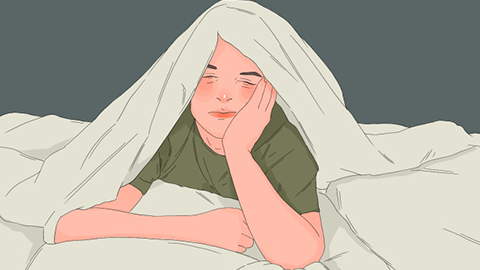What to do when you can't fall asleep at night due to insomnia
Insomnia at night may be caused by irregular作息, excessive excitement before bedtime, anxiety, depression, or hyperthyroidism. It can generally be managed by adjusting lifestyle habits, relaxing, and medication. If the problem persists, timely medical attention is recommended. Detailed analysis is as follows:

1. Irregular作息: Long-term irregular作息, such as staying up late or inverted day-night schedules, may disrupt the body's circadian rhythm, making it difficult to fall asleep at night. It is recommended to adjust作息 and maintain regular sleeping and waking times to gradually restore a normal circadian rhythm.
2. Excessive excitement before bedtime: Engaging in vigorous exercise or watching stimulating movies or TV programs before bedtime may cause excessive excitement of the cerebral cortex, making it difficult to enter a sleep state. It is recommended to engage in relaxing activities before bedtime, such as reading, listening to music, or meditating, and avoid excessive brain stimulation.
3. Anxiety: Anxiety may be caused by environmental stimuli or genetic factors. Patients often feel nervous, worried, and fearful, and these negative emotions may lead to insomnia at night. Accompanying symptoms may include palpitations, hand tremors, and sweating. The primary treatment involves psychotherapy, such as cognitive behavioral therapy. If necessary, anti-anxiety medications such as diazepam or lorazepam may be taken under medical guidance.
4. Depression: Depression may be triggered by genetic factors or event-related stimuli. Patients often experience low mood, loss of interest, and reduced energy. These emotional disorders may lead to difficulty falling asleep or early awakening at night, possibly accompanied by loss of appetite, weight loss, and slowed thinking. Doctors generally recommend seeking professional mental health support and taking antidepressants such as bupropion hydrochloride tablets, mirtazapine tablets, or fluoxetine hydrochloride tablets as prescribed to alleviate depressive symptoms.
5. Hyperthyroidism: Hyperthyroidism is caused by excessive secretion of thyroid hormones, which may lead to increased excitability of the nervous system, resulting in insomnia, accompanied by symptoms such as palpitations, excessive sweating, and weight loss. It is recommended to take medications such as methimazole tablets, propylthiouracil tablets, or carbimazole tablets under a doctor's guidance to control the condition. Surgery or radioactive iodine therapy may be considered if necessary.
In daily life, maintaining a regular作息, avoiding excessive brain stimulation, and engaging in relaxation activities to relieve stress are recommended. At the same time, maintaining a healthy lifestyle, including a balanced diet, moderate exercise, and a positive mindset, can help improve sleep quality. If insomnia persists, it is advised to seek timely medical assistance.






